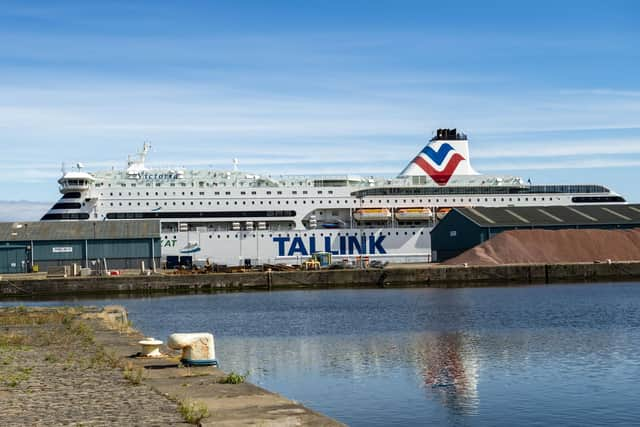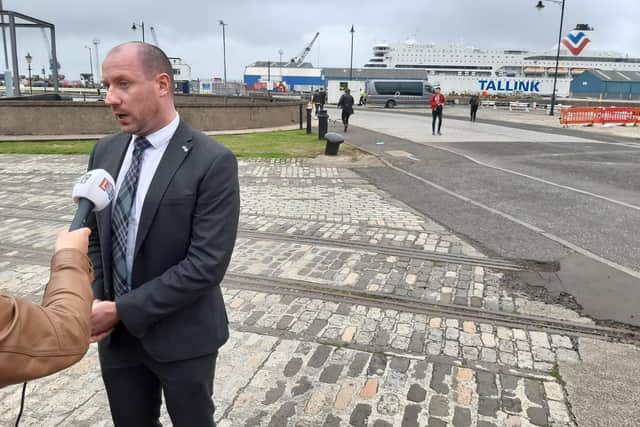War in Ukraine: More than half of 20,000 Scots who planned to host Ukrainian refugee have dropped out of scheme
Speaking ahead of a visit by cross-party MSPs to the cruise ship in Leith that is housing 1,700 refugees while the Scottish Government works to find them long-term accommodation, Mr Gray said conceded “much less than half" of those who had said they would sponsor a Ukrainian guest were still keen to do so.
He said: “The initial response was around 20,000 people who said they were willing to put forward their homes. But circumstances change, the suitability of their accommodation changes and we’re in a situation where it is now much less than that that we’re working with.”
Advertisement
Hide AdAdvertisement
Hide AdA review to overhaul the Government’s approach to housing refugees from Ukraine is underway and is due to be published in coming weeks. However, Mr Gray could not say how long people who have already been in temporary housing, either on the cruise ship or in hotels across Scotland, would have to wait before a more permanent solution was found.


The Scottish Super Sponsor scheme, which has been plagued with problems since it was launched in March, was suspended in June for three months in a bid to clear the backlog of refugees living in temporary accommodation.
Touted as a safer and easier alternative to the system set up by the UK Government, it allowed refugees from Ukraine to list the Scottish Government as their sponsor under the UK-wide Home for Ukraine visa route, rather than having to find an individual sponsor by contacting strangers through social media before applying. They would then be hosted in temporary accommodation by the Scottish Government before being quickly matched with vetted hosts.
Mr Gray said the review, which is not likely to be published for a number of weeks, would consider “creative” solutions to finding long-term housing for those who have already been granted permission to shelter in Scotland from the war. It is likely to focus on encouraging refugees to consider living and working outside the Central Belt.
The minister said: “We've got a review underway, looking at all options of temporary and long-term accommodation. It’s about making sure that we better utilise the geographical spread of very generous offers of accommodation that have been made by the people of Scotland.


"It’s about ensuring that we have better uptake of that, that we're better selling the opportunities that are available across Scotland, beyond the Central Belt. But we're looking at all potential options to ensure that we can ensure that we continue to provide a sustainable scheme.”
Mr Gray said Scotland had seen “exponential growth in terms of applications of visas and arrivals” in the final weeks of the Super Sponsor scheme, due to potential matches drying up across the rest of the UK.
He said: “That resulted in pressure on temporary accommodation. We're working through that now to try to ensure that we've got temporary accommodation available and that we're able to continue to offer that sustainable long-term support for people who have arrived from what is a horrendous situation at the moment.”
Advertisement
Hide AdAdvertisement
Hide AdIt is understood the Scottish Government fears huge numbers of refugees who have been granted a visa under the Home for Refugees scheme, but have not yet arrived in Scotland, could still turn up – and will be in need of somewhere to stay. According to the latest figures published by the Home Office, 29,830 visas have been approved under the Super Sponsor scheme. However, only 11,638 are already in Scotland.
If all refugees with valid visas take up the chance to live in Scotland, there will be thousands more than there are potential hosts available.
The number of visas granted for Scotland, through both the Super Sponsor scheme and for people arriving to live with named hosts, totals 18 per cent of all visas issued UK-wide. Scotland’s population is just 8 per cent of the UK total.
A second cruise ship is due to open its doors to refugees in Glasgow in September.
Mr Gray refused to be drawn on how long people could remain living in cruise ships and hotels.
He said: “I don't want them to be there any longer than is absolutely necessary. I've made that clear from the outset, not just in terms of the cruise ship, but also people that are in hotels.
"I want to give people the opportunity to be able to rebuild their lives independently and see Scotland as their home for as long as they need or want it to be.”
Mr Gray’s comments come as councils across Scotland are struggling with a housing crisis. Fife Council has admitted its temporary accommodation reached full capacity earlier this month, with no additional accommodation to offer to people who have become homeless. Although this shortage does not apply solely to housing people who have come from Ukraine, the issue is an indication of the scale of the problem for local authorities.
Advertisement
Hide AdAdvertisement
Hide AdScottish Liberal Democrat leader Alex Cole-Hamilton, whose family is hosting a woman from Ukraine, said he was concerned the ship could become a “floating refugee camp”.
He said: “I am very anxious about it. I understand from my colleagues in the refugee hub in my constituency that they are very comfortable here now, but it is not a permanent solution. It might be fine in August in Edinburgh to be anchored off the Port of Leith, but there’s a real danger that with the passage of time this becomes a floating refugee camp.
"Health is an issue. We're still living in a pandemic, people are confined to close quarters there and there’s an anxiety here that long term this could become a place of real discomfort for people who’ve come here for safety.”
Comments
Want to join the conversation? Please or to comment on this article.
